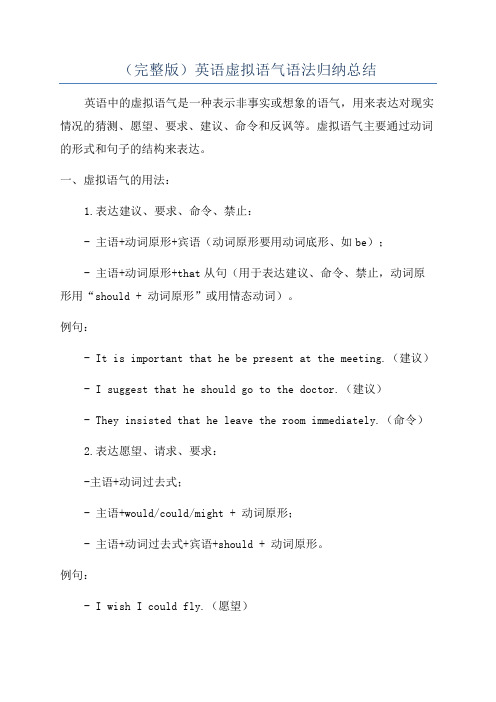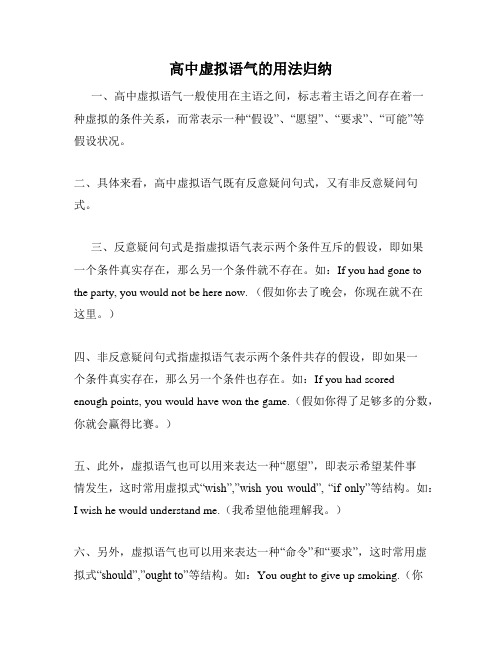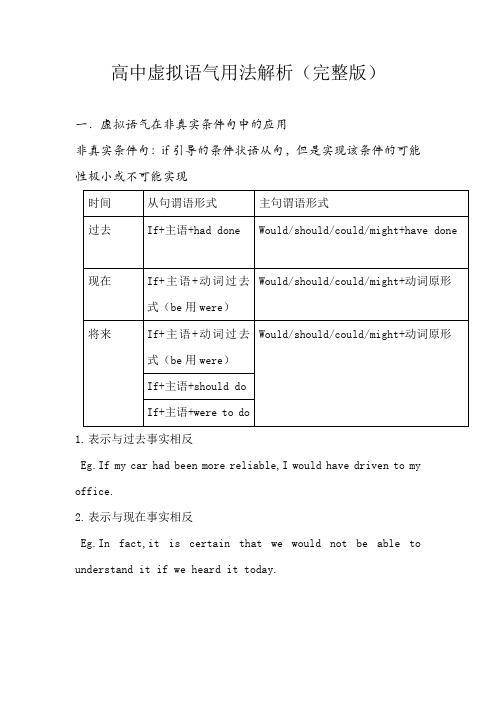高中英语虚拟语气语法总结(推荐)
(完整版)英语虚拟语气语法归纳总结

(完整版)英语虚拟语气语法归纳总结英语中的虚拟语气是一种表示非事实或想象的语气,用来表达对现实情况的猜测、愿望、要求、建议、命令和反讽等。
虚拟语气主要通过动词的形式和句子的结构来表达。
一、虚拟语气的用法:1.表达建议、要求、命令、禁止:- 主语+动词原形+宾语(动词原形要用动词底形、如be);- 主语+动词原形+that从句(用于表达建议、命令、禁止,动词原形用“should + 动词原形”或用情态动词)。
例句:- It is important that he be present at the meeting.(建议)- I suggest that he should go to the doctor.(建议)- They insisted that he leave the room immediately.(命令)2.表达愿望、请求、要求:-主语+动词过去式;- 主语+would/could/might + 动词原形;- 主语+动词过去式+宾语+should + 动词原形。
例句:- I wish I could fly.(愿望)- I would appreciate it if you could help me.(请求)3.表示虚拟条件:- If条件从句中的谓语动词用过去完成时,主句用would/should/might/could + have + 过去分词;- If条件从句中的谓语动词用过去时,主句用would/should/could + 动词原形。
例句:- If I had known his phone number, I would have called him.(虚拟条件)- If you had listened to me, we could have finished the project earlier.(虚拟条件)4.表达建议、要求、祝愿:- If only内部称述 + 主语 + 过去式。
高中虚拟语气的用法归纳

高中虚拟语气的用法归纳一、高中虚拟语气一般使用在主语之间,标志着主语之间存在着一种虚拟的条件关系,而常表示一种“假设”、“愿望”、“要求”、“可能”等假设状况。
二、具体来看,高中虚拟语气既有反意疑问句式,又有非反意疑问句式。
三、反意疑问句式是指虚拟语气表示两个条件互斥的假设,即如果一个条件真实存在,那么另一个条件就不存在。
如:If you had gone to the party, you would not be here now. (假如你去了晚会,你现在就不在这里。
)四、非反意疑问句式指虚拟语气表示两个条件共存的假设,即如果一个条件真实存在,那么另一个条件也存在。
如:If you had scored enough points, you would have won the game.(假如你得了足够多的分数,你就会赢得比赛。
)五、此外,虚拟语气也可以用来表达一种“愿望”,即表示希望某件事情发生,这时常用虚拟式“wish”,”wish you would”, “if only”等结构。
如:I wish he would understand me.(我希望他能理解我。
)六、另外,虚拟语气也可以用来表达一种“命令”和“要求”,这时常用虚拟式“should”,”ought to”等结构。
如:You ought to give up smoking.(你应该戒烟。
)七、在某些情况下,虚拟语气的句子可以表达一种可能、可能性、可能发生的推测。
这时常用虚拟式“may”,”might”,”could”等结构。
如:He might be at home.(他可能在家。
)八、由此可见,虚拟语气在日常英语口语中广泛存在,可以用于表达各种状况和愿望,提高句式的丰富性;另外,准确掌握虚拟语气的用法,也有助于提高高中生的英语表达水平。
高中英语语法之虚拟语气

虚拟语气英语中有三种不同的语气:陈述语气,祈使语气和虚拟语气。
虚拟语气表示说话人的主观愿望、猜测、建议或与事实不符的假设等,也可以表示可能性较小的情况或不可能发生的情况,而不是客观存在的事实。
虚拟语气是由句中谓语动词的特殊形式表现出来的。
1、虚拟语气用于条件状语从句中(非真实条件句)1)表示与现在事实相反的情况构成方式:If I were not busy today,I should go with you. 如果我今天有空,我会同你一起去的。
If I had any money with me, I could lend you some. 如果我带钱了,我就会借给你些。
(事实:没有带钱)If he studied harder, he might pass the exam. 如果他再努力些,就能通过考试了。
(事实:没有努力)注:主句的主语为第一人称时,主句中也可用should。
但是美语中一律用would。
might 表示“可能”,可用于主句中的所有人称。
2)表示与过去事实相反的情况构成方式:If I had got there earlier,I should/could have met her. 如果我早到那儿,我就会见到她。
(事实:去晚了)If he had taken my advice,he would not have made such a mistake. 如果他听我的劝告的话,就不会犯这样的错误了。
(事实:没有听我的话)3)表示与将来相反的情况构成方式:If he should come here tomorrow, I would talk to him. 如果他明天来这儿的话,我就跟他谈谈。
(事实:来的可能性很小)If there were a heavy snow next Sunday, we would not go skating.如果下周日下大雪,我们就不能去滑冰了。
高中英语语法个人复习总结:虚拟语气

虚拟语气虚拟语气表示动作或状态不是客观存在的事实,而是说话人的主观愿望、假设、推测,有时甚至与事实相反。
一、虚拟语气在名词性从句中的用法1、在“It’s important/ strange/ natural/ necessary that…”这类句型里,that引导的主语从句中的谓语动词常用“(should) + V-原”结构。
eg: It’s necessary that he (should) be sent there at once.2、在动词wish 后的宾语从句中对过去的虚拟:had +过去分词wish that 对现在的虚拟:动词过去时(或动词过去进行时)对将来的虚拟:would/could + 动词原形eg: I wish that I had sent the old man to hospital in time.I wish that it were spring all the year round.She wishes that she were still living with her grandmother.I wish that you would/ could come soon.3、在表示建议、命令、要求的动词如:suggest/ advise/ propose/demand/ order/ command/ insist/ request/ desire/ require/ intend/recommend/ expect等后面的宾语从句中,谓语动词常用“(should) + V-原”结构。
eg: I suggest that we (should) set off at once.但其中两个词suggest与insist要注意使用:√要使用虚拟语气√暗示建议坚持要求坚持认为eg: Jean’s face suggested that she was ill, and her parents suggested that she (should) have a medical examine.The young man insisted that he had done nothing wrong, and heinsisted that he (should) be set free.4、在advice/ idea/ order/ demand/ plan/ proposal/ suggestion/ request等名词后面的表语从句和同位语从句中,谓语动词常用“(should) + V-原”结构。
高中虚拟语气用法解析

高中虚拟语气用法解析(完整版)一.虚拟语气在非真实条件句中的应用非真实条件句:if引导的条件状语从句,但是实现该条件的可能性极小或不可能实现1.表示与过去事实相反Eg.If my car had been more reliable,I would have driven to my office.2.表示与现在事实相反Eg.In fact,it is certain that we would not be able to understand it if we heard it today.3.表示与将来事实相反Eg.If you succeed,everything would be all right.Grace doesn't want to move to New York because she thinks if she were to live there,she wouldn't be able to see her parents.4.注意事项(1)W as不可以替代were,虚拟语气中,从句中be动词只有were(2)错综时间条件句:条件句的行为和主句行为发生的时间不一致,动词的形式按照主句和从句各自的时间调整。
Eg.If he had listened to me, he would not be in such trouble now. If it had not been raining too much, the crops would be growing much better.(3)虚拟条件句中的谓语动词含有were/ should /had 时,if可省略,而将were/ should /had 置于主语前面Eg.What would have happened had Bob walked farther as far as the river bank?Should he agree to go there, we should send him there. Were it Sunday tomorrow, we should go to the great wall.两个固定搭配:①Were it not for 要不是...就②Had it not been for 要不是...就If it were not for (Were it not for)the bad weather now, we would go to the park to fly kites.If it had not been for(Had it not been for) the bad weather yesterday, we would have gone to the park to fly kites. (4)含蓄虚拟条件句:有时假设的情况不是以if条件句来表示。
高中英语高考语法知识整理复习(虚拟语气+倒装句)

高考英语虚拟语气一、虚拟条件句中的虚拟语气1、表示与现在事实相反的情况从句:If+主语+did (be动词用were)主句:主语+ should/would/might/ could + doIf I were you, I would take an umbrella.如果我是你,我会带把伞。
(事实:我不可能是你)If I knew his telephone number, I would tell you.如果我知道他的电话号码,我就会告诉你。
(事实:不知道)If there were no air or water, there would be no living things on the earth.如果没有水和空气,地球上就不会有生物。
(事实:地球上既有空气也有水)2、表示与过去事实相反的情况从句:If+主语+ had + done主句:主语+should/would/might/could+have doneIf I had got there earlier, I should/would have met her.如果我早到那儿,我就会见到她(事实:去晚了)。
If he had taken my advice, he would not have made such a mistake.如果他听我的劝告的话,就不会犯这样的错误了。
(事实:没有听我的话)3、表示与将来事实相反的情况从句:①if+主语+were to do②if+主语+should+do③if+主语+过去式(be动词用were)主句:主语+should/would/might/could+doIf he should come here tomorrow, I would talk to him.如果他明天来这儿的话,我就跟他谈谈。
(事实:不可能来)If there were a heavy snow next Sunday, we would go skating.如果下周日下大雪,我们就去滑冰。
高中英语虚拟语气知识点总结精华(附答案)
高中英语虚拟语气知识点总结精华(名师总结必考语法知识点)第一节语气英语的动词一般可带有三种不同的语气:陈述语气,祈使语气和虚拟语气。
不同的语气用动词的不同形式(有的还借助句法形式)来表示。
第二节虚拟语气的概念虚拟语气是一种特殊的动词形式,一是用来表示说话人所说的话不是一个事实,而是一种假设、猜测、怀疑等(在条件从句中或让步状语从句中);一是表示说话人的愿望、要求、命令、建议等(在宾语从句、表语从句、同位语从句)。
它能实现下列交际功能:a.用来表达一个假设或纯粹的意愿(这种假设或意愿在多数情况下是与事实相反或不太可能实现的。
b. 经常用来缓和语气,使之更加委婉、礼貌、得体,使句子带有推测性和尝试性。
c. 表示烦恼、不耐烦等情绪。
d. 表示适度的责备或批评。
e. 表示美好的祝愿或祝福。
学习虚拟语气在条件句中的用法之前我们必须清楚条件句的种类:条件句有真实条件句与非真实条件句(或称虚拟条件句)两种。
真实条件句所表的假设是可能发生或实现的,句中的条件从句与结果主句都用陈述语气。
如:If it doesn’t rain tomorrow, I wi ll go for a picnic. 假若明天不下雨,我就去野餐。
Oil floats if you pour it on water. 你如把油倒在水里,油就浮起来。
虚拟条件句所表的假设则是不可能或不大可能发生或实现的,句中的条件从句与结果主句皆须用虚拟语气。
第三节虚拟语气在条件句中NOTE:使用虚拟条件句要注意的几点:1.当条件状语从句表示的行为和主句表示的行为所发生的时间不一致时,被称为:错综时间条件句“,动词的形式要根据它所表示的时间作出相应的调整.If you had followed my advice , you would be better now.如果你听我的建议,你现在就会痊愈了.2.在条件句中,可省略if,把were ,had, should 提到句首,变为倒装句式.(后面详细讲解)If you had come earlier, you would have met him.Had you come earlier, you would have met him.1. 与现在事实相反的虚拟条件句,条件从句的谓语用动词的过去式(be的过去式用were), 主句的谓语用should (would, might,could)+动词原形。
高中英语虚拟语气(绝对全)
If my brother were here, everything would be all right. 要是我哥哥在这儿,一切都没问题虚拟语气表示所说的话只是一种主观愿望、假设或建议等。
虚拟语气的重点是:虚拟语气的特殊形式,即用来表示要求、建议、命令、提议、意愿等的主语从句、宾语从句、表语从句和同位语从句中的虚拟形式,含蓄条件句中的虚拟语气和表示愿望的虚拟形式等。
(一)虚拟语气的常见句型●与现在事实相反的虚拟语气与现在相反的虚拟语气的结构为:条件句动词为were或动词的过去式,主句为would/should/could/might+动词原形了。
If you had taken my advice,you wouldn't (couldn’t) have failed in the exam. 如果你按●与过去事实相反的虚拟语气与过去相反的虚拟语气的结构为:从句用had+过去分词,主句用would/should/could/might+have done照我的建议去做,你一定不会(不可能)考试不及格。
●与将来事实相反的虚拟语气If it were Sunday tomorrow, I should (would,could,might) go to see my grandmother. 与将来相反的虚拟语气的结构为:从句谓语动词为动词过去式或“should+动词原形”或“were to+动词原形”,主句为would/could/might +动词原形如果明天是星期天,我就(可能)去看望我奶奶。
If it were to snow this evening, they would not go out. 如果今晚下雪,他们将不出去了。
●省略if形式的虚拟语气有时条件从句中的动作和主句中的动作发生的时间不一致(表示错综时间的虚拟语气),省略连词if。
在书面语中,如果虚拟条件从句中有were,had 或should,可以把if省略,把这几个词放到主语之前,构成主谓倒装。
英语《虚拟语气》语法知识总结归纳
英语《虚拟语气》语法知识总结归纳虚拟语气(Subjunctive mood)是英语中一种特殊的语气形式,用于表示说话人的假设、愿望、建议、要求、命令等非真实情况。
虚拟语气在句子中通常与动词的调整和语法结构上的变化相关。
以下是对虚拟语气的语法知识的总结归纳:1.条件句中的虚拟语气:1.1 条件句中表示对现在的假设:使用虚拟语气的一般公式是:if + 主语 + 过去式,主句使用would/could/should/might + 动词原形。
例如:- If I were you, I would go to the meeting.(如果我是你,我会去开会。
)注意,这里的"were"是一个特殊的虚拟语气形式,用于所有人称和数。
- If she had studied harder, she might have passed the exam.(如果她努力学习,她可能会通过考试。
)1.2 条件句中表示对过去的假设:使用虚拟语气的一般公式是:if + 主语 + 过去完成时,主句使用would/could/should/might + have + 过去分词。
例如:- If I had known it, I would have told you.(如果我知道了,我会告诉你的。
)- If she had arrived earlier, she might have caught the bus.(如果她早点到,她可能会赶上公共汽车。
)2.虚拟条件句中的特殊情况:2.1 在虚拟条件句中表示命令、建议时,主句中的动词可以使用动词原形(而不是would/could/should/might + 动词原形)。
例如:- If you have any questions, please let me know.(如果你有任何问题,请告诉我。
)- If I were you, I would take a break.(如果我是你,我会休息一下。
高中英语语法虚拟语气全总结
虚拟语气在非真实条件句中①错综时间条件句:当条件状语从句表示的行为和主句表示的行为所发生的时间不一致时,被称为错综时间条件句,动词的形式要根据它表示的时间作出相应的调整。
如:, ., a .②省略句在条件句中可以省略, 把, , 提到句首,变成倒装句式。
如:I , I .→I, I .如果我还有上学的机会,我会更加努力学习。
, .→, .如果你来得早点,你就能赶上公共汽车。
, .→, .如果明天下雨的话,我们就不能登山去了。
③用介词代替条件状语从句常用的介词有, , 。
如:a ? ( a )如果你有100万元,你会做什么?’t . ( ’t )没有你的帮助,我们不可能提前完成这项工作。
, ’t .= , …= , …= , …没有你的帮助,我们不可能提前完成这项工作。
④含蓄条件句有时在虚拟语气中并不总是出现引导的条件句,而是通过其他手段来代替条件句。
如:I . , I . (副词),I . (连词)A . (定语从句)I , I . (连词), . (独立主格结构)⑤, 也可用于虚拟语气,其形式与从句在虚拟语气中的形式相同。
习题1. ___, ___ .A.,B.,C.,D.,2. ___, ___.A.,B.,C.,D.,3. (电) ___.A. B. C. D.4. I ’t , ___, .A. B. C. D.5. a , ___.A. B. C. D.6. (犹豫) a (踢) . ___a .A. B. C. D.7. ___, .A.B.C.D.8. , ___ .A.B.C.D.9. , ___.A.B.C.D.10. ___I a .A.B.C.D.11. ’t , ___.A.B.C.D.虚拟语气(1)复习题1 ___, .A. B. C. D.2.___(懒惰), (任务) .A. B. C. ’t D.3 I ’t (梯子) , ___.A. ’tB. ’tC. ’tD. ’t4 ___’s (推荐), I ’t (研究生学院).A. B. C. D.5 a , ___.A. B. C. D.6 , ___.A. B. C. D.7 ___(条款,条件), (破产).A. B. C. D.8 ___, .A. B. C. D.9 , ___.A. B. C. D.10 , I ___.A. B. C. D.11 (有魅力的,吸引人的) ___.A. B. C. D.12 I ___, I , .A. B. C. D.虚拟语气(2)——虚拟语气在名词从句中1.在由, , , , , , , 等表示建议、请求、命令、愿望等动词或其同根词引出的名词从句中,名词从句虚拟句的谓语变化的形式只有一条规律——名词从句虚拟句无论其主句的谓语动词时何种形式,从句的谓语形式均为动词原形,其中可以省去。
- 1、下载文档前请自行甄别文档内容的完整性,平台不提供额外的编辑、内容补充、找答案等附加服务。
- 2、"仅部分预览"的文档,不可在线预览部分如存在完整性等问题,可反馈申请退款(可完整预览的文档不适用该条件!)。
- 3、如文档侵犯您的权益,请联系客服反馈,我们会尽快为您处理(人工客服工作时间:9:00-18:30)。
高中英语虚拟语气语法总结
(名师剖析必考语法知识点,值得下载背诵)
虚拟语气
1)概念
虚拟语气用来表示说话人的主观愿望或假想,所说的是一个条件,不一定是事实,或
与事实相反。
2)在条件句中的应用
条件句可分为两类,一类为真实条件句,一类为非真实条件句。
非真实条件句表示的
是假设的或实际可能性不大的情况,故采用虚拟语气。
真实条件句
真实条件句用于陈述语气,假设的情况可能发生,其中if 是如果的意思。
[来源学科网]时态关系
句型:条件从句主句
一般现在时shall/will + 动词原形
If he comes, he will bring his violin.
典型例题[来源:]
The volleyball match will be put off if it ___.
A.will rain
B. rains
C. rained
D. is rained
答案B。
真实条件句主句为将来时,从句用一般现在时。
注意:
1)在真实条件句中,主句不能用be going to表示将来,该用shall, will.
(错) If you leave now, you are never going to regret it.
(对) If you leave now, you will never regret it.
2)表示真理时,主句谓语动词便不用shall (will) +动词原形,而直接用一般现在时的动词形式。
非真实条件句
1)时态:可以表示过去,现在和将来的情况。
它的基本特点是时态退后。
a.同现在事实相反的假设。
句型:条件从句主句
一般过去时should( would) +动词原形
If they were here, they would help you.
b.表示于过去事实相反的假设。
句型:条件从句主句
过去完成时should(would) have+ 过去分词
If she had worked harder, she would have succeeded.
The rice would not have been burnt if you had been more careful.
If my lawyer had been here last Saturday, he would have prevented me from going.
If he had come yesterd ay, I should / would have told him about it.
含义:He did not come yesterday, so I did not tell him about it.
If he had not been ill and missed many classes, he would have made greater progress.[来源学科网ZXXK]含义:He was ill and missed many lessons, so he did not make greater progress.
c.表示对将来的假想
句型:条件从句主句
一般过去时should+ 动词原形
were+ 不定式would + 动词原形
should+ 动词原形
If you succeeded, everything would be all right.
If you should succeed, everything would be all right.
If you were to succeed, everything would be all right.
混合条件句
主句与从句的动作发生在不同的时间,这时主,从句谓语动词的虚拟语气形式因时间不
同而不同,这叫做混合条件句。
If you had asked him yesterday, you would know what to do now.
(从句与过去事实相反,主句与现在事实相反。
)
If it had rained last night (过去), it would be very cold today (现在).
虚拟条件句的倒装[来源:Z+xx+]
虚拟条件句的从句部分如果含有were, should, 或had, 可将if省略,再把were, should
或had 移到从句句首,实行倒装。
Were they here now, they could help us.
=If they were here now, they could help us.
Had you come earlier, you would have met him
=If you had come earlier, you would have met him.
Should it rain, the crops would be saved.
=Were it to rain, the crops would be saved.
注意:
在虚拟语气的从句中,动词'be'的过去时态一律用"were",不用was,即在从句中be用were代替。
If I were you, I would go to look for him.
如果我是你,就会去找他。
If he were here, everything woul d be all right.
如果他在这儿,一切都会好的。
典型例题
_____ to do the work, I should do it some other day.
A. If were I
B. I were
C. Were I
D. Was I
答案C. 在虚拟条件状语中如果有were, should, had这三个词,通常将if省略,主语提前, 变成were, should, had +主语的形式。
但要注意,在虚拟条件状语从句中,省略连词的
倒装形式的句首不能用动词的缩略形式。
如我们可说Were I not to do., 而不能说Weren't I to do.
特殊的虚拟语气词:should
结构中的主语从句的谓语动词要用should 1)It is demanded / necessary / a pity + that…
加动词原形,should 可省略。
句型:
(1)suggested
It is(2)importantthat…+ (should) do
(3) a pity
(1)suggested, ordered, proposed, required,demanded, requested, insisted;+ (should) do
(2)important, necessary, natural, strange
a pity,a shame,n o wonder
(3)It is suggested that we (should) hold a meeting next week.
It is necessary that he (should) come to our meeting tomorrow.
2)在宾语从句中的应用
在表示命令、建议、要求等一类动词后面的从句中。
order, suggest, propose, require, demand, request, insist, command, insist + (should) do
I suggest that we (should) hold a meeting next week.
He insisted that he (should ) be sent there.
注意:如suggest, insist不表示"建议" 或"坚持要某人做某事时",即它们用于其本意"暗示、表明"、"坚持认为"时,宾语从句用陈述语气。
The guard at gate insisted that everybody obey the rules.
判断改错:
(错)You pale face suggests that you (should) be ill.
(对)Your pale face suggests that you are ill.
(错)I insisted that you ( should) be wrong.
(对)I insisted that you were wrong.
3)在表语从句,同位语从句中的应用
在suggestion, proposal, idea, plan, order, advice等名词后面的表语从句、同位语从句中要用虚拟语气,即(should)+动词原形。
My idea is that we (should) get more pe ople to a ttend the conference.
I make a proposal that we (should) hold a meeting next week.
wish的用法
1)用于wish后面的从句,表示与事实相反的情况,或表示将来不太可能实现的愿望。
其宾语从句的动词形式为:[来源学科网]
真实状况wish后
现在时过去时
从句动作先于主句动词动
作
(be的过去式为were)。
